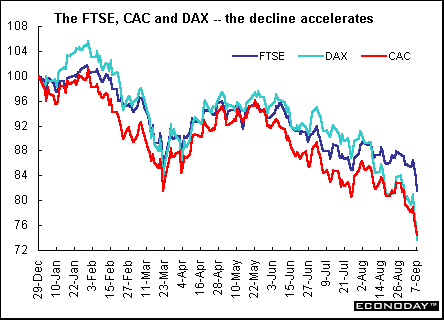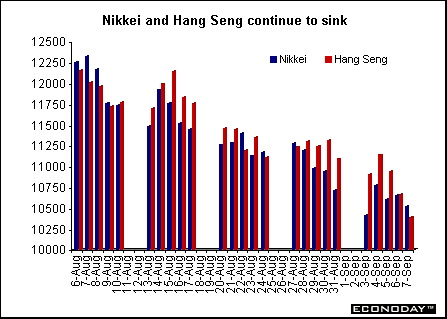
Europe and Britain
Not too long ago serious market analysts were discussing when the FTSE would go over 6000. Now the 5000 level looks to be in jeopardy. Unexpectedly high U.S. unemployment data increased worries about the global economic slowdown, and losses in the financial and the technology, media and telecommunications sectors and pushed the FTSE 100 to a three-year closing low on Friday. What really frightened the markets is that the bad news is spreading from manufacturing to services as well as to other economies worldwide.
In March 2000, nine largely old economy stocks dropped out of the FTSE 100 to be replaced by large new economy groups with little in the way of profit. It proved in retrospect a great time to switch into old economy stocks! Next week, however, the FTSE 100 will restructure again. Between six and eight new economy stocks will drop out of the index to be replaced by old stalwarts.

European equities markets ended the week some six to eight percent lower, because investors were fearful the jump in U.S. unemployment would mean that the U.S. consumer would cut spending. In sharply above average volumes, shares fell across the spectrum. The Paris CAC 40 was down 5.9 percent on the week, and in the process fell to its lowest level since August 1999. The Frankfurt Dax fared worse, sinking to a March 1999 low and losing 8.8 percent on the week.
The latest sell-off in equity markets has been triggered by fears that the global economy, instead of recovering later in the year, may be heading for a new period of weakness. Investors are also nervous about the prospects for the corporate sector, particularly given the debt problems of telecom groups. The earnings downgrades, which began in technology, have spread to a wider range of companies and industries and show no sign of relenting.
Asia
The U.S. employment report was released after Asian markets closed, but equity investors there had their own bad news to deal with on Friday. Japan confirmed that their economy sank at an annualized rate of 3.2 percent in the second quarter. And analysts think that it won't get any better in the third. Both the Nikkei and Hong Kong Hang Seng were very volatile last week. The reasons for their weakness really haven't changed. The onslaught of poor economic data combined with declining profit expectations have depressed investors, who are bailing out because they don't see any hope of a quick U.S. recovery. Hong Kong continues to be buffeted by the cross winds of the telecommunications debacle and continuing property valuation problems aside from precipitous declines in exports especially to the United States. Markets ended broadly lower on the week on continuing concerns about the global economy. The Heng Seng slid to a two and a half year low while the Nikkei continued to bounce around its 17 year low.

Japan has decided to open its financial system to IMF inspectors. Japan's decision defused a potential conflict with the IMF, which last week asked to send a team of inspectors to Tokyo to gauge the extent of its non-performing-loan crisis. Japan initially responded coolly to the idea. The audit will be conducted under the IMF's Financial Sector Assessment Program, an existing monitoring program conducted in conjunction with the World Bank. The IMF already has audited more than a dozen countries, including Canada. Japanese regulators have been facing increased pressure to bring greater transparency to their financial system. In a recent report, the IMF urged Tokyo to consider injecting fresh capital into Japanese banks. The report cited private sector estimates that the banks may have to take 20 trillion yen to 30 trillion yen ($165.7 billion to $248.55 billion) more in charges on their loan losses than the Financial Services Agency expects. Top agency officials have ruled out a government capital injection as unnecessary and have publicly criticized the IMF for using private analysts' estimates in its report.
 |


Introduction • Global Stock Market Indexes • Recap of Global Markets • Currencies • Indicator Scoreboard

The Bottom Line • Looking Ahead
|